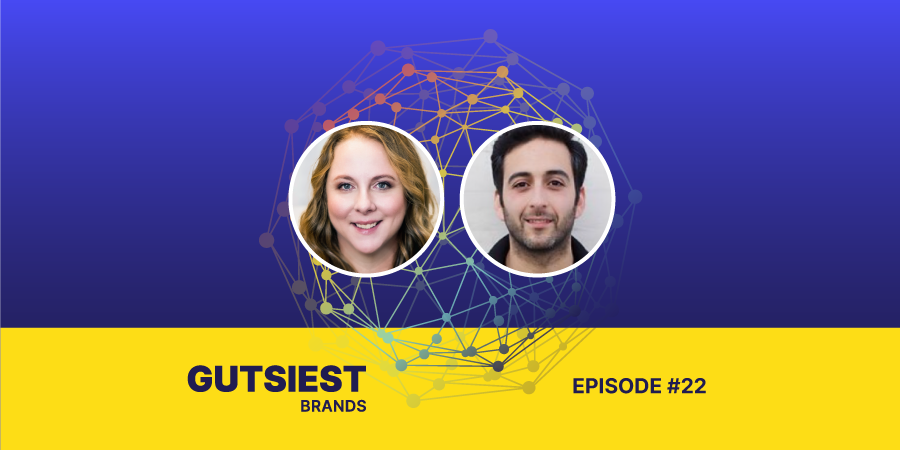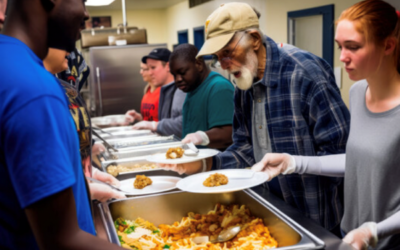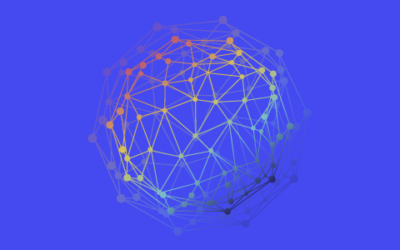
Permission to Evolve with Miguel Garcia Castillo
(highlights from Episode #22 of the Gutsiest Brands podcast)
Check out the latest lessons from our season one finale of the Gutsiest Brands podcast as GutCheck’s Chief Revenue Officer, Jess Gaedeke, sits down with Miguel Garcia Castillo, the Founder and Principal of c/olabworks, an independent venture and brand studio. They talk about utilizing empathy in creating new companies, the importance of market research and trusting your gut, and how losing a pair of Nikes as a child can make a brand impact.
Miguel started out his career journey selling Michelangelo’s and Raphael’s. And by that, he means selling Ninja Turtles drawings he made in primary school to his friends at the lunch table. “Technically, that’s my first job in my life,” he says. Today, Miguel uses everything he’s learned to bring creativity to new brands. His company, c/olabworks, focuses on “the discovery and exploration of emerging cultural trends and categories as part of that studio model.”
Here’s some of what he’s learned along the way…
Takeaway #1 – Empathy Leads to Exploration
Miguel is an expert on integrating empathy into a business. “I think empathy in our studio model is really important,” he says. “It’s not only about how we work internally, but it’s about the process that we take to explore some of these areas that, in my opinion, require a level of empathy to understand that they are valid areas of exploration.” Miguel is always saying yes to new ideas, new topics, and new interests. Why? “Because when you look at that empathetic lens – look at all the projects and all the opportunities with an empathetic lens – you can understand that there could be something there for somebody. That may not be you; it may not be the person next to you; but something may exist that people may be wanting or looking for.” One universally needed sector that Miguel is bringing more empathy to is healthcare. “What better proof of empathetic behavior, empathetic decision-making, and an empathetic process than healthcare,” he says. Ultimately, by incorporating empathy into business, we create more meaningful and impactful outcomes for the business itself and consumers alike.
Takeaway #2 – Ask the “No” Questions
Questioning ourselves and considering the reasons why someone might say “no” can be a powerful tool in business. As Miguel puts it, “I think part of the process is always having an answer to the next ‘no’ question. Or to the next ‘no’ feeling.” By anticipating objections and having a plan in place to address them, we can increase the likelihood of our business succeeding. Hearing “no” is a natural part of being in business. But Miguel reminds us that “Having doubters is okay. I think that’s actually what makes the diligence and the process so important – to ensure that they’re wrong.” By asking tough questions and diving into our creative sides, we can find that “needle in the haystack” – which is not an easy feat. “However, it allows us to ask the tough questions ahead of time. It asks us also to utilize creativity. [There’s an] overwhelming curiosity, I think that we have and that we carry as a team to be able to say, ‘but what if the answer is yes?’”
Takeaway #3 – Know When and Where to Lean Forward
So, how does Miguel answer the question, “what if there’s something there”? He leverages “data science, expertise, and experience to be able to fill in the blanks. That allows us to move things forward. I think that’s what has really become the way that we go into every single opportunity that may be presented in front of us.” Different categories emerge into the market in different ways. “Recreational cannabis, the future of education, conscious hospitality – some of these other areas are a little bit more forward-leaning in terms of going into places where there may not be a light on yet.” Miguel and his team use all the tools at their disposal (both hard data and gut feeling) to tread into the darkness and figure out how to navigate through uncertainty and when to lean into a new idea.
Takeaway #4 – Empathy Leads to Collaboration
Sometimes, all anyone needs is someone to take a chance on them to succeed. This requires the right people, the right ideas, and empathy to make it happen. “It’s the power of saying yes. [We give] that empathetic chance to places that may not seem profitable, may not seem like they’re good for business. They may not be good for VC and funding.” But this is what Miguel is trying to solve with c/olabworks. “There needs to be somebody that believes in some of these nuggets. And that’s how we want to be.” Miguel works closely with founders and teams to help them reach their goals. Miguel says, “We’ve now been able to not only connect on a very personal and human level with the founders and with the teams, but we’re also starting to find that we have the permission to help them evolve and change and improve.” Collaboration toward a singular purpose is what drives teams to success. “In a short-winded way, the connection with the founders, the connection with the founding team that is going to work on this, is a huge part of if we are going to take on these opportunities.”
Takeaway #5 – Use Market Research for Prospecting
Miguel says, “Market research plays a huge role for us, and I would say it plays a key role in two different places. The first one is at the beginning of the process when we’re really in the ideation stage. And I’m not even talking about the ideation of the actual project or product or company.” Miguel says that by “setting a fence” around a blank space in the market, we can see needs well before they come to light and anticipate viability because these white spaces are “impactful places to explore and develop something.” But viability goes beyond the ability to make money. “What we operate [on] is viability based on the opportunities that we can see,” Miguel explains. “And if a good concept is a hundred-million-dollar company – great, awesome. If it’s a ten-million-dollar company – great, awesome. That market research is going to help us ensure that we are always keeping everything in line and focused, but more importantly, realistic in terms of what we’re trying to build.”
Miguel‘s Best Advice?
“My advice for founders and organizations looking to be more gutsy is to know that the worst thing that you can be is wrong. And once you understand that and you know that [with] every decision you make, there’s a good chance you’re wrong, it removes some of the weight, and it removes that monkey on your back that you always have to be right […] When time and experience settle into your career, you realize that being a facilitator to questions, to problems, to challenges, to options, to ideas is better than trying to be always right. One of the things that I always notice is [that] people get petrified of making the wrong decision. And that’s actually something that we would talk about a lot internally and externally. The worst thing you can be is wrong, so make the decision and go with it.”
Keep Learning
Catch up on Jess and Miguel’s full interview by listening to the Gutsiest Brands podcast. Plus, stay tuned for upcoming announcements and the launch of season 2 with guests from some truly groundbreaking brands!
If you are interested in how your brand can uncover the deep customer insights that can enable you to lead with empathy, pioneer new paths, stand behind bold ideas, and lean into ‘the power of AND’, we’d love to help. Drop us a note!
Written By
Want to stay up to date on the latest GutCheck blog posts?
Check Out Our Most Recent Blog Posts
When Vocation and Avocation Collide
At GutCheck, we have four brand pillars upon which we build our business. One of those is to 'lead...
Reflections on Season 1 of Gutsiest Brands
Understanding people is at the heart of market research. Sure, companies want to know what ideas...
How Technology Can Be More Human: Treating Customers as Humans, Not Data Points
Check out these snippets from the amazing conversation Toluna’s EVP of Enterprise, Jess Gaedeke,...
1-877-990-8111
[email protected]
© 2023 GutCheck is a registered trademark of Brainyak, Inc. All rights reserved.
© 2020 GutCheck is a registered trademark of Brainyak, Inc. All rights reserved.



